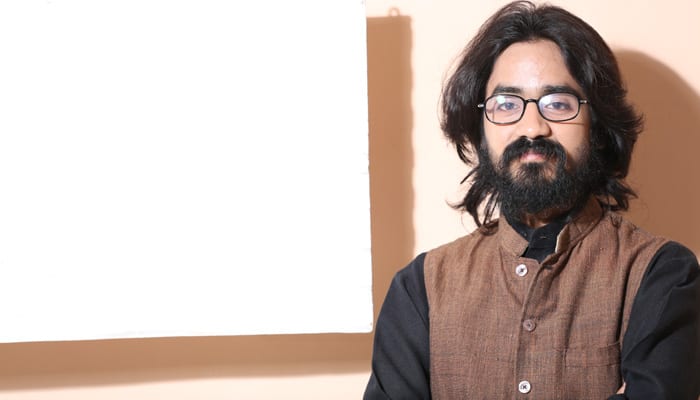Humour is a new sin. The intolerant world we are living in seems to have pushed this thought across us as was proved by the recent attack on French satirical magazine Charile Hebdo. In a candid talk with India's 'controversial' cartoonist Aseem Trivedi, Tarun Khanna of Zee Media Corp tries to comprehend whether free speech is an essence of evolution or an offence.
Trivedi came into limelight after he was arrested and jailed for making satiric cartoons of national symbols in 2012. Here are the excerpts from the conversation:
From an aspiring illustrator to a controversial cartoonist, you were made a youth icon even before you could realise it. How did it all happen?
Aseem: I’ve been making cartoons for the past 10 years now. However, when I began working with some newspapers in 2009, I had not an iota of thought that my life would undergo a sea change. It was Anna Hazare’s crusade against corruption that stirred me to do my bit through cartoons. I sketched various caricatures satirising widespread corruption in the nation. My cartoons had ironic illustrations of national emblem, Parliament, national flag and constitution.
However, the day I exhibited my cartoons in MMRDA ground Mumbai, my website was banned on the special instructions of Crime Branch. Wasting no time, I uploaded all work on my personal blog. This sparked nationwide outrage. There were voices from all corners supporting my cause. Justice Markandey Katju defended me. Suppression of my voice became a matter of profound discussion in Parliament. International media began talking about it. When I was arrested and sent to jail, I decided not to hire any lawyer. I was confident that the support I was getting from common people was bigger than any argument to be given by a legal practitioner in the court.
When you had touched national emblem, national flag and other national symbols, were there apprehensions that you may offend some patriots?
Aseem: If you have to convey a thought to masses, but in limited words, then how do you do it? On Twitter, when you post a thought in merely 140 characters then you use limited but hard-hitting words to draw attention. Similarly, when I was making cartoons for newspapers, I was able to make my viewers grin, but could not incite their inner conscience. Cartoons in newspapers are usually unmoving. I wanted my cartoons to make an impact.
I had dared to touch the national symbols because people’s sentiments are linked to them. And I was certain that striking that most sensitive chord was sure to rouse their conscious.
After the incident, did you try to make daring pictures again or have you played safe?
Aseem: Of course I did. I’ve not left my daring side yet. Indeed, after the attack on Charlie Hebdo, I dared to make an illustration portraying Prophet Muhammad. The illustration shows that the Prophet is against those who resort to violence on his name.
If Charlie Hebdo’s cartoons were published in India, would they have got same massive support as in France?
Aseem: Charlie Hebdo cartoons would have never got support here. We often witness intolerance towards movies, art forms and lifestyles. Till date, some cartoons made by the father of political cartooning in India, K Shankar Pillai, are craving for acceptance. They were removed from NCERT books, citing they offended BR Ambedkar.
I’m sure the Indian media would also have exercised restraint if such an incident had happened here. The reason that Indian media is condemning the Charlie Hebdo attack is because the international media is railing against it and the former doesn't want to be labelled different.
What did we do to our very own painter MF Hussain. Despite showing brilliance through his brush strokes, he died after years of living in self-exile. His fault was that he made nude paintings of Indian deities notwithstanding the belief that nudity is a form of purity in Hinduism.
Don’t you agree that humour for one can cause offence to other?
Aseem: When you try to break a myth, you are sure to offend someone. If you'll tell Hindus that some of the customs they religiously follow are mere superstition, you will certainly offend many of them. Likewise, if you'll tell Muslims that women in their religion should get the right to choose between burkha and other outfits, you will offend some. But due to fear of offending someone you cannot refrain yourself from calling a wrong, a wrong. If Raja Rammohan Roy or Mahatma Gandhi had shown concern to human sentiments over eradication of social evils like untouchability or Sati Pratha, we would still have been living in the same age. In Islam they claim that making portraits is prohibited. However, today we have many Muslim painters and artists. The world is changing and the need of the hour is to match its pace.
I denounce those extremists who in order to defend their redundant religious ideology oppose the precious preaching of their God. The preaching that inculcates feeling of peace over violence and evolution over destruction. For whose protection do they pick up arms? The almighty is self-reliant and doesn’t need an army of disillusioned people to do justice.
Shouldn’t there be a parameter for free speech to avoid tensions?
Aseem: Who will set it? If you'll place an entity or individual above you to judge your speech then you may end up confining your own freedom. Let the people use their right to speech in a manner they want. They will fall and learn.
When British had granted us complete independence, they had warned us that we would not survive without them. Today, we are not only surviving, but growing. A child learns from his experience. Once we’ll begin exercising our freedom of speech in complete manner, we’ll understand its nuances. And as far as tensions are concerned, the people who want to incite violence will anyway find excuse for it.







